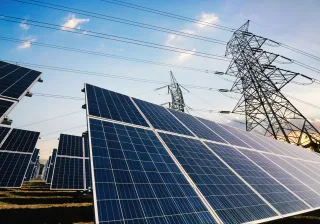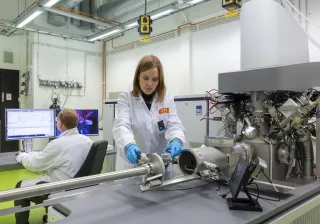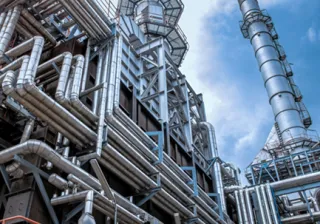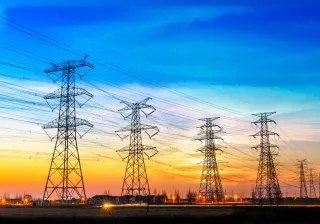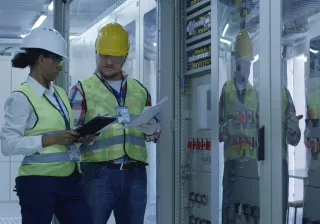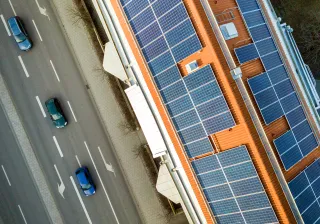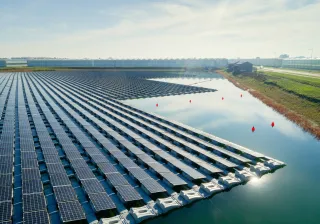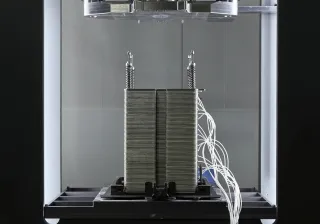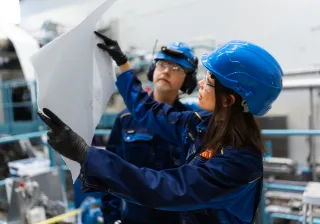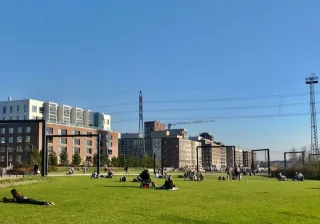Energy industry
New energy solutions of the future are vital for the fight against climate change. Emissions from energy production, transport and housing must be practically eliminated, and the schedule is tight. VTT develops and experiments with low-carbon energy solutions and smart energy systems. We also help you look beyond energy systems towards sector integration and help you build systemic solutions for modern society's needs.
The solution for the challenge are smart and flexible energy systems, wide utilisation of sector integration, digitalised energy consumption, greater use of renewable sources of energy and practical exploitation of nuclear energy. VTT can put together a wide range of solutions addressing the whole energy value chain, taking into account the production, delivery, storage and consumption of energy. VTT is also building a leading European piloting centre for clean energy innovations.
VTT's more than 500 energy industry experts can help overcome the energy challenges of customers and society.
Energy production of the future will be more decentralised
Future energy production methods must be capable of supplying energy sustainably, reliably and competitively. Renewable energy could account for as much as 100% of future energy supply. We believe that energy production is moving toward more decentralised system based on renewable energy sources.
The most important sources will be a low-carbon energy mix: wind power, solar energy, hydropower, nuclear energy and bioenergy. VTT helps various actors from different parts of the energy value chain to ensure the continuity and sustainability of their business through science and technology.
The nuclear industry has a vast number of ongoing developments for the future of nuclear, like Small Modular Reactors and nuclear fusion. VTT has also developed a low-temperature nuclear reactor for district heating. We can provide advice how to become involved in the development, and when and how to start applying new technologies.
Digitalised smart grids enable future proof energy distribution
Finland is a frontrunner in many areas of future energy technologies, such as smart grids, AI and machine learning technologies. Timing of energy use is becoming more important than the amount of energy used, hence the energy system must be flexible to adapt the demand peaks in a smart way. Cross-sectoral integration of energy, transportation and heating improves efficiency, flexibility and economic feasibility.
VTT accelerates development of future energy systems. We combine the latest digital technologies like 5G/6G, AI and data analytics with energy system analyses. VTT can help you simulate changing conditions, reconsider your role in the new energy system and navigate through the transition.
Explore our white papers and case stories around energy distribution:
Balancing future energy emissions and systems
Energy system balancing is highly important aspect, whether we speak about emissions, production capacities or momentary dynamics. As the system becomes more decentralized, also balancing takes place on different levels and by different actors. It is essential to utilize the possibilities of sector integration and flexibility. In addition to technical solutions, we look at market development and regulation ensuring proper markets for balancing services.
Battery technologies play a key role in the ongoing shift from the use of fossil fuels towards sustainable transportation and renewable energy production.
We have developed competences and facilities for applied energy storage R&D since late 2010.
- Organic batteries are environmentally friendly and safe to use
- New materials also have good electrical properties, like faster charging than current battery technologies can provide.
- We are also looking for other novel battery solutions, which could answer to the increasing energy demand.
Carbon capture and storage techniques help create net negative greenhouse gas emissions and are key technologies in reaching climate targets.
- VTT has modelled, evaluated, developed and demonstrated new innovative CCU and CCS concepts for the most important sources of global CO2 emissions.
- We’ve created solutions for industry, transport, electricity and heat as well as agriculture and forestry.
Hydrogen technologies play an increasingly important role in mitigating climate change. From manufacturing to transport and beyond, advances in hydrogen technologies and new regulation create opportunities for companies to transition toward clean energy and industry. VTT partners with companies from all stages of the hydrogen value chain to develop new H2-based solutions and offer consultation, testing, and validation services.
VTT has world-class knowhow and constantly develops research facilities to serve equipment manufacturers as well as system integrators and end-users of clean hydrogen technologies.
The future consumer is more aware and an active part of the energy value chain
A smart energy system allows consumer being active in different ways, including for instance production of electricity, demand response and local storage options. Digital services provide consumer better information and awareness of their energy behavior. Advanced analytics provide clear insights and AI proposes improvements for instance in settings or daily routines. VTT is in the forefront of offering digital services to monitor and manage the energy consumption for instance through smart meters, sensors and automation systems.
Machine learning and AI can be utilised together with VTT's energy expertise to improve energy efficiency and accuracy of energy forecasting in all kinds of buildings. Digital twins are used to simulate the behavior under different circumstances.
Buildings - and demand side more generally - have a significant potential for making the energy system more cost-efficient and reliable through demand response schemes and other forms of active participation.
Prosumers are consumers that not only consume, but also produce energy. In the future, millions of us will become small-scale energy producers.
- An energy community can be, for example, an apartment building or a housing company where transferring energy among neighbours is easy
- Moving away from a centralised energy system towards a more geographically distributed, prosumer-centric model benefits all parties.
- Energy communities and prosumers can sell flexibility services to electricity system operators.
VTT’s energy know-how benefits energy companies, technology businesses and service providers, government departments, public authorities, cities and towns. As a research and innovation partner, VTT is on the frontlines of developing new, smart industrial and smart city solutions. We develop business models and technologies side by side – through our cutting-edge multidisciplinary technological know-how.




